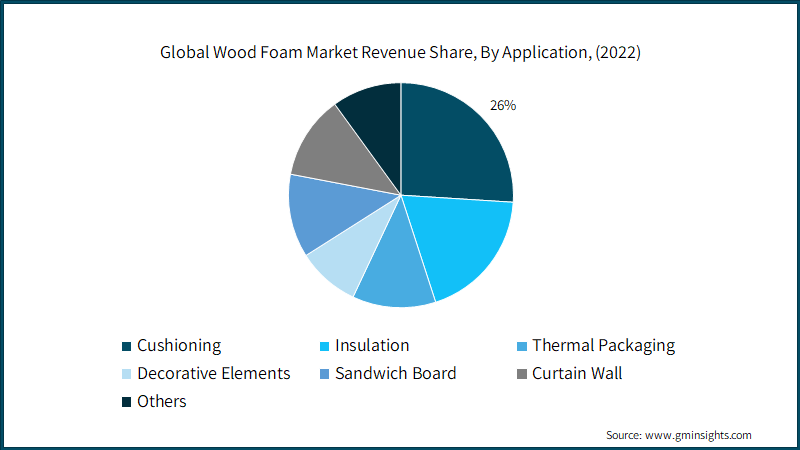Home > Construction > Construction Materials > Wall and Ceiling Materials > Wood Foam Market
Wood Foam Market Analysis
- Report ID: GMI5666
- Published Date: May 2023
- Report Format: PDF
Wood Foam Market Analysis
Based on end-use, the industry is segmented into packaging, building & construction, automotive, and furniture. The packaging segment of wood foam market will expand at more than 6% CAGR through 2032, propelled by the rising shift toward sustainability and carbon-neutral materials that are eco-friendly in comparison to traditional foam packaging materials. Moreover, many packaging companies are driven towards the cost-effectiveness of wood foam as wood is easily available in the market. The packaging industry contributes highly to the GHG emission every year and the use of wood foam is considered a promising alternative.
With respect to application, the market is segregated into cushioning, thermal packaging, insulation, decorative elements, sandwich board, and curtain wall. The wood foam market value from the cushioning segment was worth USD 60 million in 2022. Cushioning materials are used in various applications, such as packaging, transportation, and furniture. Growing demand for sustainable and eco-friendly cushioning materials is generating lucrative opportunities. The porous structure of the wood foam allows it to compress and deform under pressure, which helps to dissipate energy and reduce the force of impact, making it an effective material for protecting fragile or delicate items during shipping or transportation.

Europe wood foam market crossed USD 88 million in 2022, attributed to a growing focus on carbon footprint reduction and growing demand for lightweight and high-performance materials in several end-use industries. Additionally, strong efforts by the European Union on promoting the use of sustainable materials for the circular economy have increased product adoption in the region. A 2022 research study by Open Research Europe concluded that wooden by-products such as wood foam, lignin-based adhesives, glycols, and bioplastics drive preference for bio-based alternatives in the region.

